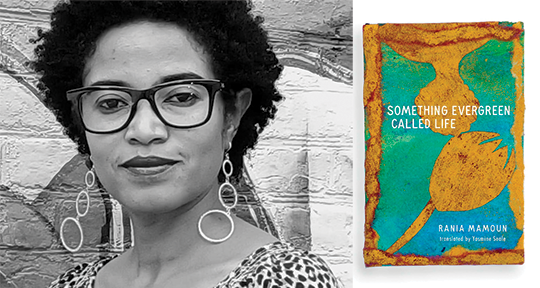Something Evergreen Called Life by Rania Mamoun, translated from the Arabic by Yasmine Seale, Action Books, 2023
An outspoken activist against the regime of Omar al-Bashir, Rania Mamoun was forced to flee her homeland of Sudan in 2020 and seek asylum in the United States with her two small children. As a cloud of fear and uncertainty cloaked the globe, asylum turned to exile; COVID-19 rendered everywhere unsafe. Written against this backdrop of extraordinary circumstances, Something Evergreen Called Life is Mamoun’s first collection of poetry. The result of a hundred-day commitment between the artist and her friend as they sought direction and companionship during the most isolated phase of the pandemic, she credits her daily practice of putting verse to feeling for her survival and restoration. Mamoun is the author of two novels in Arabic, Green Flash (2006) and Son of the Sun (2013), as well as Thirteen Months of Sunrise (2019), a collection of short stories translated into the English by Elisabeth Jaquette and shortlisted for the Warwick Prize for Women in Translation in 2020. Her contribution to Banthology: Stories from Unwanted Nations (2018), was formerly reviewed in Asymptote.
Something Evergreen Called Life is a collection of free verse. While organized chronologically, with a day or two passing in between each poem, there is no illusion of exposition. Like innermost thoughts, the poems interject themselves, exemplifying the lack of introduction or transition in our most private ponderings. As a result, we read Mamoun’s poems like the revelations of a close confidant; because she writes without shame, there can be no judgment. It is in this unrelenting vulnerability that Something Evergreen Called Life finds its power.
At its core, Something Evergreen Called Life reflects the ebbs and flows of Mamoun’s deep depression:
the water goes over me
I am drowning
without getting wet
grasping the hem of survival
struggling for breath



